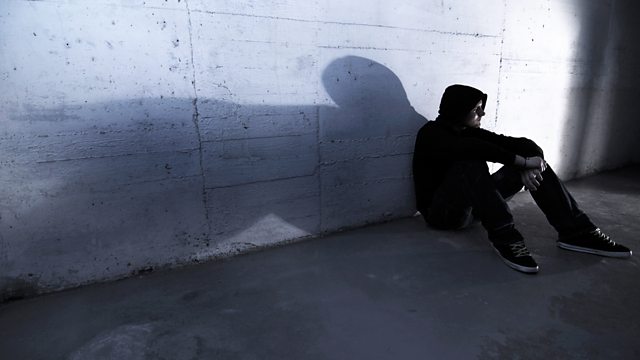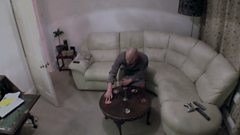
07/08/2013
The science behind the most common mental illnesses that affect young people - why they develop, what's going on inside our bodies and what we can do to treat them.
Anxiety, a small bout of depression or an obsessional thought - all of us can have these feelings at some time but what if these persist and take over our life? In the UK, one in four people will suffer from some form of mental health problem every year. What causes it differs for every one of us: our genes, lifestyle or events from the past can all play a part. But whatever the trigger, mental illness can happen to anyone, at any time.
Using computer graphics to travel inside the body, this film explores the science behind mental illness. We'll discover the social, biological and psychological changes that happen to five people suffering from different mental health disorders and unravel the treatments that are helping them overcome their conditions.
We meet Wayne, a 24-year-old who 10 years ago was diagnosed with Social Anxiety Disorder and lives in fear he'll suffer incontinence whenever he goes out. As we hear from his psychiatrist we discover how the body reacts to certain stimuli and why in some, these mechanisms overreact. One in 20 adults in the UK suffer from some kind of an anxiety disorder.
We follow Ross, a 27-year-old diagnosed with schizophrenia - a mental illness that affects feelings, thinking and behaviour. He shows us videos and excerpts from his diary that he recorded during a manic period of his life. We also hear from his father how mental illness affects not just the sufferer but their family too.
We also meet Ffion, a 23-year-old living with anorexia nervosa. She is trying to gain enough weight to be healthy enough to go university. We observe her participation in a cutting edge research project which uses TMS - magnetic brain stimulation to try and alter her perception of food.
We also delve into the science behind OCD and bipolar disorder and hear from young people who are suffering from these illnesses and trying hard to overcome them.
Last on
Clip
-
![]()
David and his OCD
Duration: 01:56
Music Played
-
![]()
Two Door Cinema Club
Handshake
-
![]()
The Vaccines
Possesive
-
![]()
The xx
Reunion
-
![]()
Ghostpoet
Coldwin
-
![]()
The Knife, Shannon Funchess & Emily Roysdon
Stay Out Here
-
![]()
The Killers
Flesh and Bone
-
![]()
Deptford Goth
Lions
-
![]()
The Knife
Old Dreams Waiting to be Realized
-
![]()
Daughter
Touch
-
![]()
Daughter
Shallows
-
![]()
Delphic
Tears Before Bedtime
-
![]()
Mumford & Sons
I Gave You All
-
![]()
Ghostpoet
Comatose
-
![]()
Everything Everything
Torso of the Week
-
![]()
Bastille
Overjoyed
-
![]()
Everything Everything
Cough Cough
-
![]()
Laura Mvula
She
-
![]()
Noah and the Whale
Introduction
-
![]()
Ghostpoet
Dial Tones
-
![]()
Daft Punk
Motherboard
-
![]()
Big Black Delta
Love You This Summer
-
![]()
Example
One Way Mirror
-
![]()
Boards of Canada
Turquoise Hexagon Sun
-
![]()
Kraftwerk
Aerodynamik
-
![]()
Ghostpoet
Sloth Trot
-
![]()
D.I.D.
Do the Right Thing
-
![]()
Birdy
People Help the People
-
![]()
Silverchair
After All These Years
-
![]()
DJ Shadow
Stem/Long Stem
-
![]()
Daughter
Amsterdam
-
![]()
The Knife
Cherry on Top
-
![]()
Everything Everything
Undrowned
-
![]()
Bastille
Bad Blood
-
![]()
Daughter
Lifeforms
-
![]()
The Knife
Ready to Lose
-
![]()
Foals
My Number
-
![]()
Deptford Goth
Feel Real
-
![]()
Purson
The Contract
-
![]()
Deptford Goth
Union
-
![]()
The Isley Brothers
Summer Breeze
-
![]()
Laura Mvula
Green Garden
Can cognitive behavioural therapy really change our brains?

Cognitive behavioural therapy (CBT) is a type of talking therapy that's used to treat a wide range of mental health problems, from depression and eating disorders to phobias and obsessive-compulsive disorder (OCD). It recommends looking at ourselves in a different way that might prove useful for all of us in everyday life. But what happens to our brains when we have CBT?
听
Credits
| Role | Contributor |
|---|---|
| Narrator | Rebekah Staton |
| Producer | Sue Learoyd |
| Director | Sue Learoyd |
Broadcasts
- Wed 7 Aug 2013 20:00
- Thu 8 Aug 2013 02:30
- Mon 12 Aug 2013 02:00
- Wed 14 Aug 2013 03:00
大象传媒 Three - It's a Mad World Season
Think you know mental health? Think again. Find out more about the all the documentaries.


